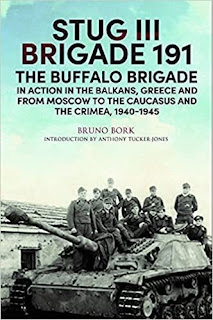STUG III Brigade 191 The Buffalo Brigade written by Bruno Bork and published by Greenhill Books - £25.00 - Hardback - Pages 311
This illustrated volume tells the tale of Brigade 191, aka the ‘Buffalo Brigade’, who used the Sturmgeschütz III as they took part in Operation Barbarossa in the Ukraine, saw action during the fight for Greece in 1941 and were deployed to the areas of heaviest fighting in the campaign against the Soviet Union. This began with the infantry advance from Ukraine to Moscow (1941): then to Voronezh, Kursk, the Caucasus and Kuban (1942), then the Kertsch Peninsula and the Crimea (1943-1944), before they were finally evacuated from Sevastopol into Romania by naval lighters. On the South-east Front (the retreat through the Balkans), the Brigade fought its way into Austria and was still fighting on the last day of the war to keep a corridor open.
Keen to write an account recording the tactical significance of the Sturmgeschütz III, while surviving members of Brigade 191 also wished for a cohesive documentary record of the war, Bork set about gathering military records and literature, as well as interviewing as many ex-Brigade men as possible, in order to bring this detailed account into being.
A fascinating book indeed that tells the story of German troops in the German army serving with Brigade 191. This unit served from as far as the Balkans and Greece to Moscow and Kursk. Through the thoughts and opinions of first-hand accounts of German soldiers this book clearly reveals the harshness of life and conditions serving in this unit and the devastating encounters they faced and endured. We now see more and more of these books detailing the ‘other side’ of the story by giving us the opinions and evidence of the German side, an excellent thing as this can only give us a better and fuller picture of important events. This book is well written by the author Bruno Bork and I must say that the book contains a great number of photographs which I think do the book much credit and appeal. I would happily recommend this book to others, especially those interested in German first-hand accounts.








.jpg)
